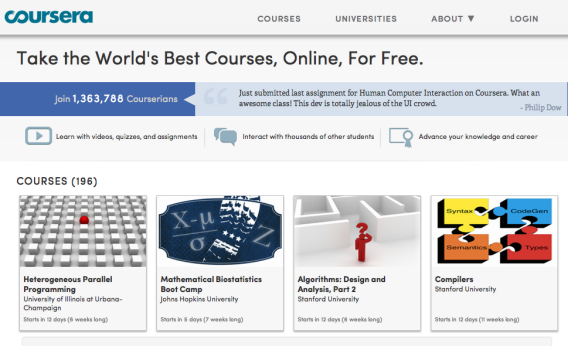In the fast-evolving realm of free online college courses, Coursera seems to be evolving the fastest.
Launched publicly just five months ago by Stanford computer science professors Andrew Ng and Daphne Koller, the for-profit startup has been growing almost exponentially. It started with four university partners—Stanford, Michigan, Penn, and Princeton—putting it on relatively equal footing with rivals such as Udacity and EdX. In July, though, it announced a dozen more, including Caltech, Duke, and Virginia.
Today it announced that it has again doubled its roster, with 17 additions that span the globe and signal a further branching-out into the arts and humanities. Here’s the full list of new partners:
- Berklee College of Music
- Brown University
- Columbia University
- Emory University
- Hebrew University of Jerusalem
- Hong Kong University of Science and Technology
- Mount Sinai School of Medicine
- Ohio State University
- University of British Columbia
- University of California, Irvine
- University of Florida
- University of London
- University of Maryland
- University of Melbourne
- University of Pittsburgh
- Vanderbilt University
- Wesleyan University
Fresh course offerings range from a course in improvisation taught by jazz musician Gary Burton at the Berklee College of Music to the École Polytechnique Fédérale de Lausanne’s “Functional Programming Principles in Scala,” taught by the man who designed the Scala programming language. The sheer volume and variety of Coursera classes seems likely to propel the startup to pre-eminence among MOOCS, the awkward acronym for “massive, open online courses.”
How is it growing so fast? By leaving all the labor-intensive parts of online education—the teaching, the curriculum selection, the quality control—to its partners, the universities themselves. Whereas Udacity offers its own curriculum and EdX is run by three universities that offer only their own courses on the site, Coursera focuses on providing a platform that, in theory, just about any university can use.
At a time when schools are tripping over themselves to join what might or might not turn out to be a revolution in higher education, Coursera has positioned itself perfectly to capitalize on their eagerness. Universities can join on a trial basis with only a couple of classes, and Coursera requires no exclusive commitment, so they’re not closing off any other options. What board of regents could resist?
With the platform’s explosive expansion has come concerns about cheating and questions about whether online lectures and tests can really substitute for a classroom experience. Those are big questions for the future, especially once universities start experimenting with offering real credit for online classes. For now, as I’ve argued before, Coursera and its kin—including Udemy, which partners with individual professors rather than institutions—amount to an increasingly viable 21st-century substitute for textbooks. Given how lucrative that industry has been, Coursera could be in for huge success.
